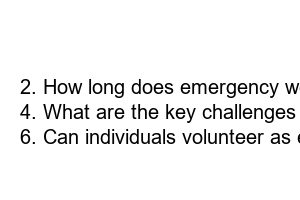긴급복지 신고의무자 교육
Title: Emergency Welfare Reporter Training: Preparing for Crisis Situations
Introduction:
In times of crises and emergencies, effective communication and accurate reporting are crucial for the welfare of affected communities. Emergency welfare reporters play a vital role in disseminating vital information and coordinating relief efforts. This blog post explores the importance of emergency welfare reporter training, its significance, and how it can contribute to efficient crisis management.
1. The Importance of Emergency Welfare Reporter Training:
Emergency welfare reporter training equips individuals with the necessary skills and knowledge to report on crises, disasters, and emergency situations. These reporters act as a bridge between affected communities and emergency response agencies, ensuring accurate and timely information is shared.
2. Enhancing Communication Skills:
*Effective communication skills form the foundation of emergency welfare reporting.*
Through training, reporters learn how to gather information, interview survivors, and transmit information succinctly, ensuring clarity and comprehension in their reports.
3. Crisis Reporting Techniques:
*Emergency welfare reporter training familiarizes individuals with crisis reporting techniques.*
This includes understanding the hierarchy of information dissemination, building relationships with authorities, and employing strategies to overcome challenges faced during crisis reporting.
4. Ethical Considerations in Crisis Reporting:
*Ethics play a critical role in emergency reporting.*
Training emphasizes the importance of empathy, sensitivity, and respect when dealing with survivors and affected communities, ensuring their stories are shared responsibly and respectfully.
5. Utilizing Technology and Social Media:
*Technology has revolutionized the way emergency news is shared.*
Training programs focus on leveraging various digital tools, social media platforms, and mobile reporting apps to enhance the reach and effectiveness of emergency reporting efforts.
6. Collaboration with Emergency Response Agencies:
*Collaboration is key for efficient crisis management.*
To ensure accurate reporting, emergency welfare reporters receive training to work hand in hand with emergency response agencies, coordinating efforts, and providing essential updates in real-time.
7. Reporting in High-Stress Environments:
*Training prepares reporters to deal with the pressures and challenges of reporting in high-stress environments.*
Preparing mentally and emotionally, managing deadlines, and ensuring self-care are crucial elements covered in the training to ensure reporters can perform optimally.
Summary:
Emergency welfare reporter training equips individuals with the skills and knowledge necessary to report on crises and emergency situations. From enhancing communication skills and crisis reporting techniques to ethical considerations and leveraging technology, this training prepares reporters to provide vital and timely information during times of crisis.
—–
FAQs about Emergency Welfare Reporter Training:
1. What qualifications are required to become an emergency welfare reporter?
2. How long does emergency welfare reporter training typically last?
3. Is emergency welfare reporter training available online?
4. What are the key challenges faced by emergency welfare reporters?
5. Are there any certifications or accreditations provided after completing the training?
6. Can individuals volunteer as emergency welfare reporters during non-emergency periods?

